A court of arbitration ruling is a normative act that draws up the results of resolving any issues at a particular stage of the trial. The main difference between them and court decisions is that they do not give an answer on the merits of the claims that were stated. These are acts that mainly regulate the trial itself.
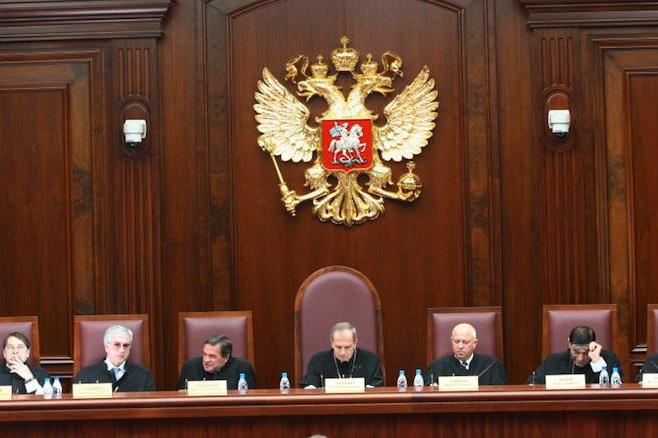
The rulings of the arbitral tribunal may be classified according to certain criteria.
Content Classification
According to the content there are:
- Preparatory, that is, those that determine the adoption of an application for the production or preparation of a case, the demand for evidence, etc. Their purpose is to create conditions for the protection of the disputed or violated rights.
- Squamous, that is, those that can prevent the initiation of proceedings. For example, the refusal to accept a complaint, the return of the application, etc. A sample ruling of the arbitration court is presented below.
- Disciplining - on the appointment of judicial fines.
- Final, the completion of which ends the judicial proceedings in a particular case. For example, about leaving some claim without consideration, etc.
- Associated with court decisions. For example, on the correction of descriptions in it, etc.
- Which are related to the execution of the decision. For example, about the turn of performance, etc.
- On the review of any judicial acts, which is associated with the new circumstances of the case.
Subject classification
For entities that accept definitions:
- Those that are taken solely.
- Those that are accepted collectively.
In shape:
- Definitions that are made by a separate act.
- Protocol definitions.
In order of removal: those that are taken out in the deliberation room, and those that are taken out without removal into it.
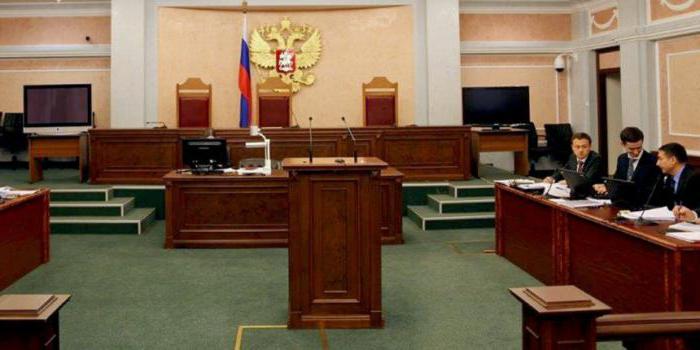
In the order of their appeal
The rulings of the arbitration court, which are subject to appeal separately from the judicial act itself, and those which are not subject.
The arbitral tribunal shall approve all determinations in writing, except for protocol determinations, which are announced verbally and are also recorded in the minutes of the meeting.
On legal force
Legal force has features.
Apart from the decision, definitions may enter into it, by which:
- the case is blocked;
- objects of private appeal.
The rest comes into force together with the decision.
This happens immediately with the definitions:
- decisions on newly discovered circumstances;
- on the satisfaction of applications for review of the decision.
Preparatory definitions do not have a property of exclusivity, while final definitions do. Absolute everyone has the property of bindingness, and those who appeal separately from the decision also have the property of irrefutability.
The property of prejudice is absent, since the conclusions are not final, and the court can make adjustments in the process without first canceling the determination.
Upon entry into force, they receive the property of fulfillment, but can be executed immediately.
What should be recorded in the documents
According to the law, in the definitions should be fixed:
- place and date of making such a determination;
- name of the case and its number;
- name of the court, its composition, as well as the name of the person who compiled the minutes of the meeting;
- names of persons who participated in the case;
- the issue on which this determination was made;
- the motives by which the arbitral tribunal could be guided at the time the decision was made;
- findings of the trial;
- terms and procedure for appealing against the ruling;
- whether it is possible to file a complaint against the ruling of the arbitral tribunal.
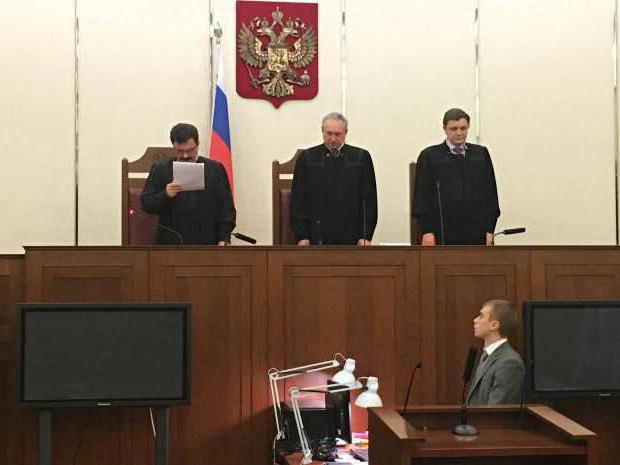
The document recorded in the form of a protocol must indicate the issue that was considered by the arbitration court, as well as the reasons for which this determination was made. Copies of all documents that were issued in the form of a specific judicial act must be sent to all persons who participated in the case, as well as to other persons interested in it. Such copies are sent in the form of registered letters within five days and are handed to recipients under signature.
Deadlines
The rulings of the arbitral tribunal shall be executed immediately, unless otherwise provided by these arbitral tribunals or legislative acts of the state.
As was said, the definitions of arbitration courts differ from decisions in that they do not resolve the dispute on the merits. Nevertheless, they are also acts of the court, which must be legal, possess the properties of irrefutability, obligatoriness and be executed in accordance with the requirements of the law.
What other definitions of an appellate arbitration court?
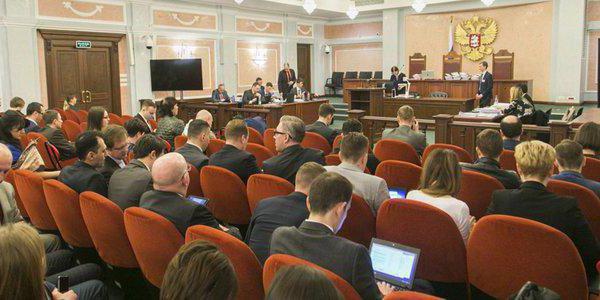
Private definitions
The tasks of arbitration proceedings are not only the protection of violated rights, but also the prevention of such violations. One of the means of preventing these offenses are private definitions. They are issued by arbitration courts in all cases of violation of the law or regulations during the activities of any organizations or government bodies.
They are issued not only by the courts of the first instance, but also by the cassation and appeal instances. This should be done in the deliberation room, while all issues relating to a particular case are discussed in advance. In such a case, the court must find out the circumstances in which the right was violated, as well as evidence by which this can be confirmed. In addition, the arbitral tribunal determines which official or state body is required to eliminate such an offense.
How are these documents executed?
Private definitions, as a rule, are made out in the form of separate acts and contain details defined by law. They should be sent to those officials who are obliged to eliminate these offenses, after which they must report to the arbitration court no later than within a month. Only those definitions that are executed in the form of separate normative acts are subject to a similar direction, and such distribution is carried out within five days.
Moreover, they can be appealed.
The definitions of arbitration courts are divided into two groups:
- those subject to appeal;
- those that are not subject to appeal.
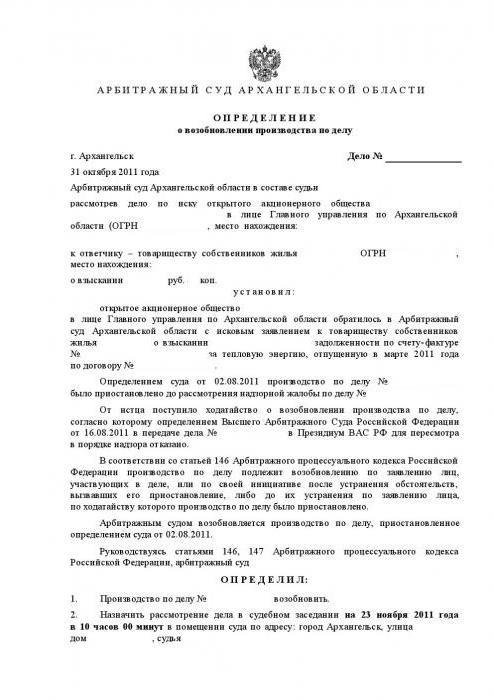
Appeal against rulings of arbitration courts
This is a fairly new feature of procedural legislation, which is designed to verify the legality of judicial acts that have not entered into legal force. If a case is considered in the court of appeal, it is subject to consideration from the very beginning.
Appealing a ruling of an arbitration court is, of course, a difficult matter.
The arbitral tribunal must, at the time of appeal, verify the correctness of the judgment. And such an assessment should be carried out, taking into account not only the legal, but also the actual side of the issue. He is obliged to re-examine all the evidence and arguments of the appeal.
Being the stage of the appeal process, the appeal proceedings are a set of actions carried out by the arbitration court, as well as persons who are directly involved in the case, aimed at adequately checking the validity of the decisions taken.
Terms and order of submission
Terms and procedure for filing an appeal on the determination of the arbitration court:
- May be appealed separately from the act by which the consideration of the case ends. But this applies only to those cases when the appeal is provided for in the law, or interferes with further proceedings.
- The complaint may be sent for consideration to the court of appeal within one month from the date of the determination.
- A complaint against a decision approved by the arbitration court may be sent to the court of cassation no later than one month from the date of its adoption.
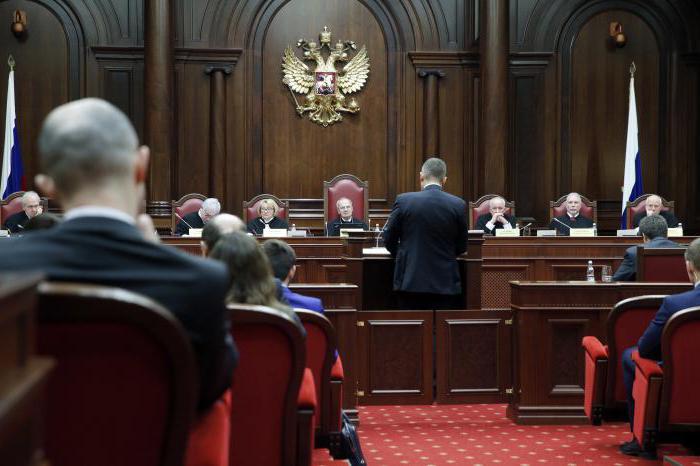
Based on the results of the consideration of all complaints received for determination, the Supreme Arbitration Court has the right:
- leave it unchanged and dismiss the complaint;
- cancel it, after which such a case should be re-examined;
- completely cancel or partially cancel it.
Conclusion
So, court rulings are its rulings, which essentially do not resolve the dispute, and thus differ from court decisions. They can resolve only certain issues relating to the consideration of the case, its termination or order. The definitions made by the arbitration courts differ in nature, the consequences of their adoption, as well as in their form and subjects. Those that complete the trial should be distinguished from those that are submitted during its implementation.

At the stage of consideration of cases, arbitration courts make such rulings that maximally facilitate the court to make an informed and lawful decision directly aimed at protecting the legitimate rights and interests of all participants in such a lawsuit. They also help its very implementation within the framework of the law. The definitions of the arbitration courts of the Russian Federation are an independent and most widespread variety of all acts that they approve, the non-fulfillment of which entails a certain responsibility, which is also provided for in the legislation of our country.